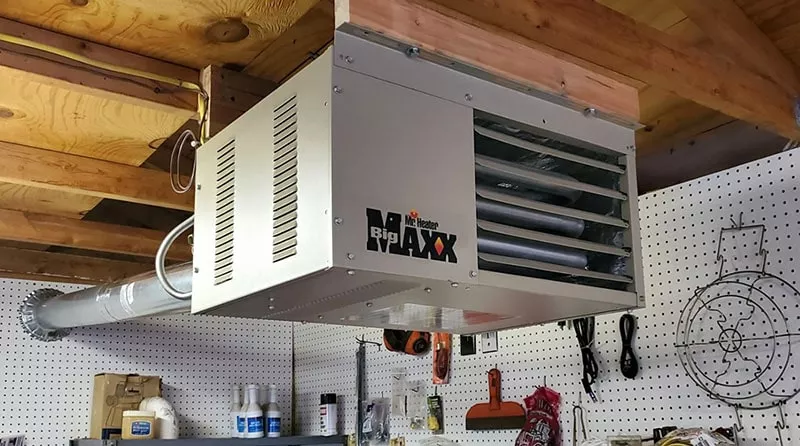A freezing cold wood workshop is uncomfortable to work in. But what’s the best heater for wood workshops?
Wood workshops are quite special places not all heaters are suited for. Frequently, the air is dusty (from sawing and sanding), there’s a lot of flammable wood around, and oftentimes, wood workshops are not insulated too well.
So, an ideal wood workshop heater can handle dust exposure, is fire-safe, and outputs enough heat to keep your workshop at whatever temperature you desire.
In this article, we’re going to find you the right wood workshop heater.
Gas or Electric Heater: What to Pick for Your Wood Workshop?
For most wood workshops, an electric or a gas-based heater is going to be the best choice. Which one depends on a few factors:
Gas Heaters (Usually) Output More Heat
Does it need to be cozy warm (as in family living room-warm), or just warm enough for working? Gas-based heaters can output much more power than electric heaters since they are not limited by your workshop’s electric circuit.
Electric heaters output less heat, but still enough to add some warmth and take away the chills during the freezing winter.
There are exceptions. Heavy-duty electric heaters output a lot of heat.
I’ll list one electric heater that generates as much heat as a gas-based heater in this list (rank #3). But this one needs a dedicated install into your workshop’s electric circuit. You can’t just plug it in a wall outlet.
Gas Heaters Add Humidity, Electric Heaters Remove Humidity
Gas heaters will add humidity to your wood workshop, while electric heaters generally remove humidity. This can affect the wood you’re working with. But for most hobby workshops, it doesn’t matter.
Most Gas Heaters don’t Require Electricity
Can your electric grid handle an electric heater? Fuses may trip when you run an electric heater and other power tools such as electric drills or saws simultaneously.
In this case, a gas heater is the better choice, since it runs completely independently of the electric grid.
Considering these aspects, let’s have a look at my ranked list of the best wood workshop heaters:
Best Wood Workshop Heaters
1. Dyna-Glo Wall-mounted Heater (Propane Gas, 30,000 BTU)
The best wood workshop heater is a wall-mounted propane heater. My recommendation is this 30,000 BTU/h Dyna-Glo propane heater (click to view it on amazon).
With 30,000 BTU/h it outputs almost as much heat as a wood stove, while still being simple to install.
All you need is a propane tank (bigger is better - I recommend 100lb) and you’re set for months of cost-effective heating.
The Dyna-Glo propane heater of course has a knob to adjust the heat output, so you can generate whatever temperature you desire. It’s strong enough to make your wood workshop cozy warm (as in: you can work during freezing winter just wearing a shirt), but you can of course run it at lower, more economic settings.
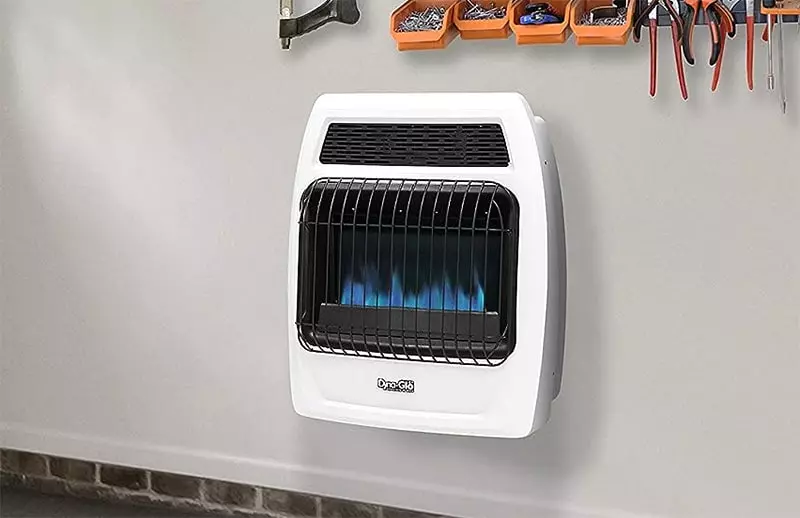 The best wood workshop heater is a wall-mounted Dyna-Glo propane heater. It outputs lots of heat, takes up no floor space, and is dust-safe.
The best wood workshop heater is a wall-mounted Dyna-Glo propane heater. It outputs lots of heat, takes up no floor space, and is dust-safe.
This Dyna-Glo model series comes with different BTU (heat output) ratings. I recommend the 30,000 BTU variant for moderate to large wood workshops, since it’s really strong.
For smaller workshops, get the 20,000 BTU/h model, or even the 10,000 BTU/h one.
But in general, you can’t go wrong just picking the 30,000 BTU model. I consider any heater I buy also a backup heater for my family in case of an energy outage. And in an emergency, it’s better to have a stronger heater than a weaker one.
Since propane heaters add some humidity to the space you’re heating, you’ll need to vent every couple of hours (or, say, once a day).
The Dyna-Glo propane heater is completely dust-safe, since dust settling on it burns off quickly, and does not have a built-in blower that clogs up over time.
Since it doesn’t need any electricity to run, it does not interfere with other heavy-duty machines you use in your wood workshop.
It’s a perfect heater for the practicing craftsman.
2. Dr. Infrared DR-998 (Electric, 5,120 BTU)
Ranked second in this list is the Dr. Infrared DR-998 (click to view it on amazon).
The Dr. Infrared DR-998 is an electric infrared heater, protected by a solid wooden case that lasts and can take hits.
It’s the best electric heater for wood workshops. The Dr. Infrared requires no installation.
Contrasting many other electric heaters, with the Dr. Infrared DR-998 you can choose the humidity of your room. It’s got a built-in humidifier, which is perfect for wood workshops. Depending on what you’re doing, dry or humid air can be an advantage.
If you don’t care about humidifiers, just pick the regular Dr. Infrared heater (without humidifier).
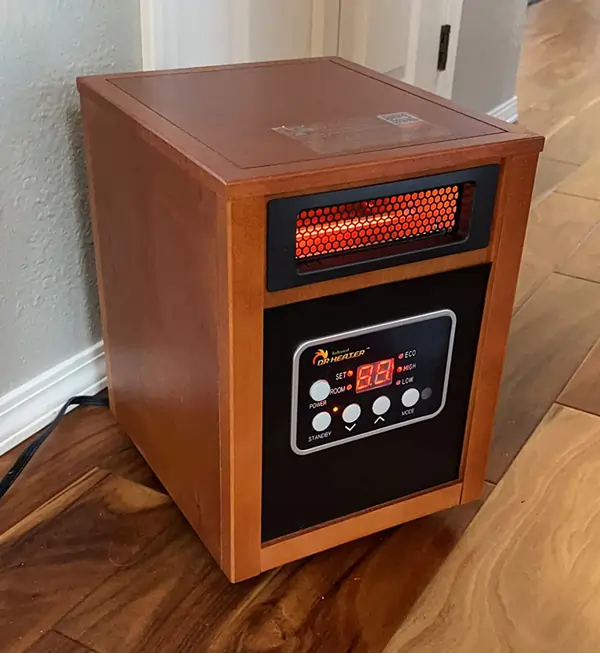 The Dr. Infrared heater requires is the easiest-to-setup heater in this list. Just plug it in a wall outlet, and you’re set.
The Dr. Infrared heater requires is the easiest-to-setup heater in this list. Just plug it in a wall outlet, and you’re set.
Contrasting the Dyna-Glo propane heater (my #1 recommendation for wood workshops), the Dr. Infrared outputs significantly less heat. That’s normal, since all standard wall outlet electric heaters (in the US) are limited to 1,500 Watts. That’s an equivalent of 5,120 BTU. The Dyna-Glo heater was 30,000 BTU.
( I’ll recommend a heavy-duty electric heater that can reach propane heater-level heat outputs in the next section! )
But even 5,120 BTU is still enough for most small wood workshops, up to the size of a 2-car garage. Surely, it gets you an adequate, comfortable working temperature.
Infrared heaters produce a focused beam of heat rays, which makes you feel very warm. Infrared heaters heat instantly. There’s no need to wait for your workshop to heat up. You feel heat coming off the heater within a few seconds after turning it on.
The biggest advantage of an electric infrared heater over a propane heater is that you never have to refill gas / fuel.
However, in an energy outage, you won’t be able to use an electric heater as a backup device.
The Dr. Infrared heater has a built-in blower which sucks in air, heats it up, and blows it back into the room. Any heater that blows hot air eventually accumulates dust. For that, the Dr. Infrared has a built-in filter that you have to wash every few months.
Some electric heaters don’t have filters, so the dust will clog the internal electronics, leading to hardware failures due to overheating. Luckily, this can’t happen with a Dr. Infrared heater!
3. Comfort Zone CZ220 (Electric, 17,000 BTU)
The best heavy-duty electric heater for wood workshops is the Comfort Zone CZ220 (click to view it on amazon).
It’s a 5,000 Watts heater that you have to hard-wire into your workshop’s electric circuit. The heat output is 17,000 BTU/h, which is similar to that of a strong propane heater.
With the Comfort Zone CZ220, you get the heating power of a propane heater combined with the low maintenance of an electric heater.
Its main drawback is, in my opinion, the installation. You need to hard wire it into a 240V single-phase circuit. The installation should be done by a professional electrician.
Aside from that, it’s a great heater.
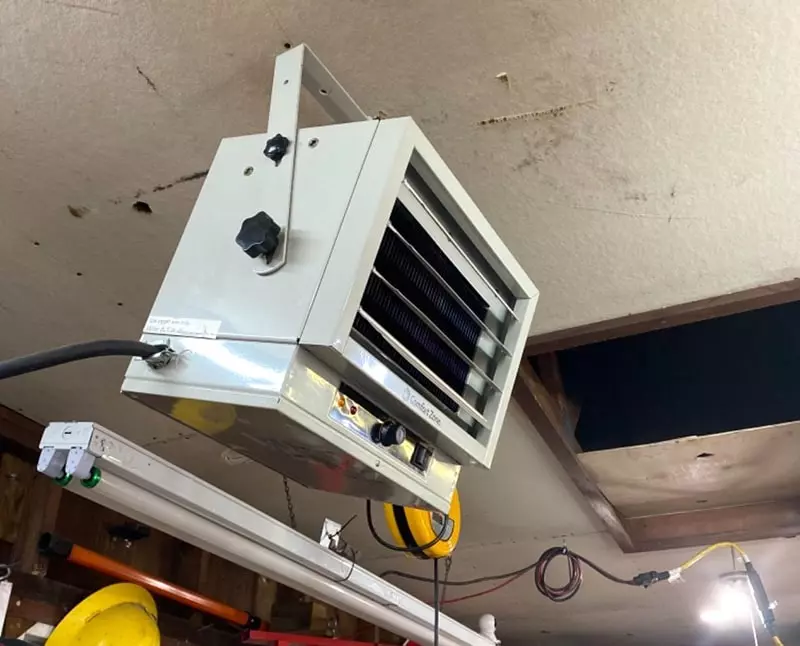 The heavy-duty electric heater Comfort Zone CZ220
The heavy-duty electric heater Comfort Zone CZ220
You can mount it to the ceiling, so it takes up virtually no space.
The Comfort Zone CZ220 is perfect for larger wood workshops (the size of 2-4 car garages), even if they are not well-insulated.
It is the strongest electric heater in this list. There are some stronger 7,500-watt models on the market. But the Comfort Zone CZ220 is more than strong enough for most wood workshops.
If you need an even stronger heater than 5,000 Watts, I highly recommend getting a propane heater over a 7,500 Watts electric heater. The running cost of electric heaters is much higher (for the same heat) than that of a propane heater.
For a 5,000 Watts heater, you’re going to pay $0.85 in heating cost per hour (5kW × $0.17 per kWh). An equivalent propane heater would cost $0.46 per hour.
If cost matters, prefer propane over electricity. But if you prefer low maintenance and time-saving, get this heavy-duty electric heater.
4. Mr. Heater Big Maxx (Propane Gas, 50,000 BTU)
Another great heater for large wood workshops is the Mr. Heater Big Maxx (click to view it on amazon). It outputs a full 50,000 BTU of heat per hour.
The Mr. Heater Big Maxx is a large ceiling-mounted gas heater, compatible with natural gas and propane (conversion kit is included).
The Mr. Heater Big Maxx is not a standalone system. It requires access to electricity to be able to run the built-in thermostat (regular wall outlet), the built-in blower, and the electric auto ignition.
It also comes in 80,000 BTU and 125,000 BTU variants, but these are usually too large for regular wood workshops.
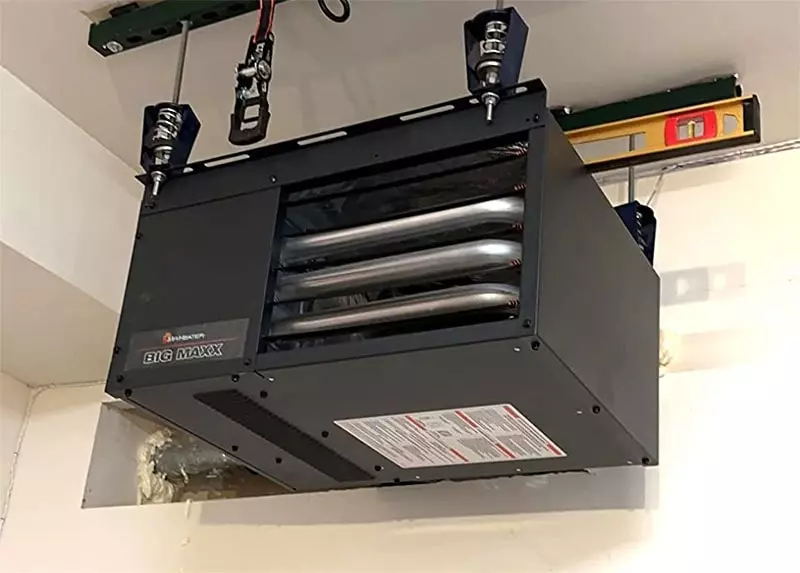 The Mr. Heater Big Maxx is the best heater for large wood workshops.
The Mr. Heater Big Maxx is the best heater for large wood workshops.
Even though the Mr. Heater Big Maxx is a propane heater, it does not work without electricity, so it is not laid out for emergency heating.
The combination of electric and gas-based heating is an advantage. You combine cheap gas power with the precise control and safety capabilities of an electric heater.
The Mr. Heater Big Maxx is ideal for wood workshops the size of 3, 4, or more cars. With it, you’ll be able to heat uninsulated wood workshops to a comfortable temperature.
The 50,000 BTU/h heating power makes up for any heat loss quickly.
5. Mr. Heater Big Buddy (Propane, 18,000 BTU)
The last heater in this list is a portable propane heater. It’s the Mr. Heater Big Buddy (click here to view it on amazon).
The Mr. Heater Buddy models are the most popular portable propane heaters. So, they can’t miss in this list.
The Mr. Heater Big Buddy is the strongest of the Buddy models and outputs 18,000 BTU/h of heating power.
It’s got a similar heat output as a heavy-duty electric heater but requires no installation.
And on top of that, it costs less to run than an electric heater (see more electric vs propane heater differences).
And finally, the Mr. Heater Big Buddy requires no electricity to run, and is portable. The combination of all these makes it a perfect backup heater for emergencies.
On top of that, the Mr. Heater Big Buddy is dust-safe, since it doesn’t blow air and, therefore doesn’t clog over time. And any dust settling on it quickly burns off or is carried away by the hot air rising from the Mr. Heater Buddy.
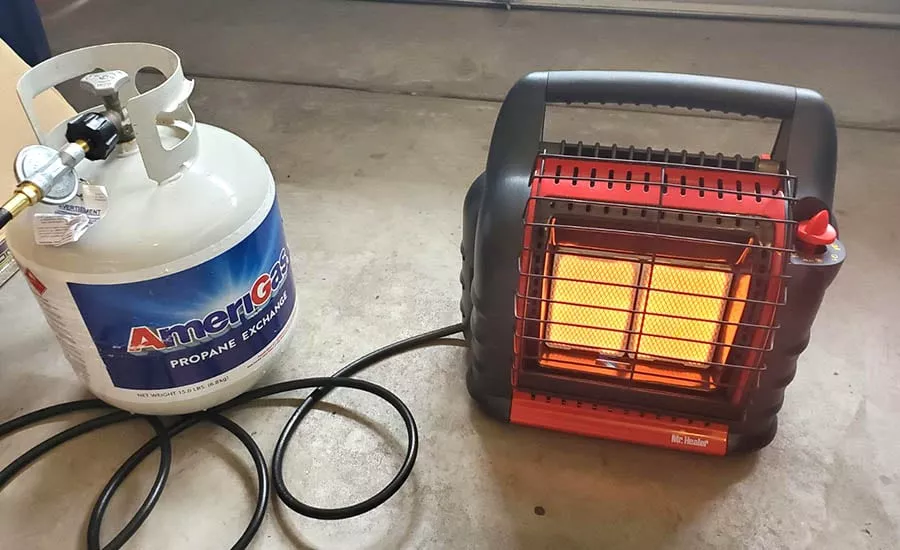 The Mr. Heater Big Buddy is my favorite portable propane heater.
The Mr. Heater Big Buddy is my favorite portable propane heater.
The Mr. Heater Buddy models come in different sizes. I find the 18,000 BTU Big Buddy model the best choice for most wood workshops, the size of a 2-3 car garage.
Instead of buying the regular 9,000 BTU Buddy model, you might as well get the 18,000 BTU Big Buddy and run it at half power. Then, if you ever need more heating power, you are prepared.
The Big Buddy is completely indoor-safe. In an emergency, you can easily bring it indoors and heat your living space.
With the Big Buddy, you can’t go wrong. The only downside is that it can’t be wall- or ceiling-mounted(or at least is not intended to be … ), and therefore will take up some floor or desk space.
Which Wood Workshop Heater Should You Pick?
The rankings in this list are arbitrary. For some, an electric hardwire installation is not an option, which rules out the heavy-duty electric heater. For others, a regular electric heater is too weak and additionally strains your wood workshop’s electric circuit, which rules out the Dr. Infrared heater.
So, the heater that’s best for you is going to be a very personal choice.
However:
The wall-mounted Dyna-Glo propane heater is a safe choice for most wood workshops. It provides enough heat to keep you comfortable in deep winter, doesn’t take up floor space, and doesn’t wear down due to dust. It even works without electricity.
You can’t go wrong with a wall-mounted propane heater in a wood workshop. If you are not sure which heater to pick, get the Dyna-Glo and see whether you like it.
If you have a large wood workshop, you can’t go wrong with the Mr. Heater Big Maxx.
It uses some electricity, but won’t interfere with your electric power tools. It’s just a blower and a thermostat, which amounts to something in the ballpark of 60 Watts.
Conclusion
In conclusion, finding the right heater for a wood workshop is crucial for creating a safe and comfortable working environment.
Throughout this article, we have explored both gas and electric heaters, each with their distinct advantages and potential drawbacks.
Gas heaters such as the Dyna-Glo Wall-mounted Heater and the Mr. Heater Big Maxx, are powerful and reliable heaters. The Dyna-Glo is well-suited for a range of workshop sizes and the latter for larger spaces.
These heaters are ideal for those seeking high heat output and can work independently of the electric grid, making them reliable even during power outages, though they require propane refills and installation.
Electric heaters, such as the Dr. Infrared DR-998 and the Comfort Zone CZ220, provide ease of use, lower maintenance, and the added benefit of moisture control, which can be crucial for woodwork.
While they may not offer the raw heating power of gas heaters and are dependent on the electrical system, they are often more convenient to install and use in smaller spaces.
Ultimately, the best heater for your wood workshop will depend on the size of the space, your access to electricity and gas, the level of insulation, and your specific heating needs.
Whether you opt for a heavy-duty electric heater for its simplicity and control or a powerful gas heater for its heat output and independence from electricity, safety and the nature of your work should always guide your decision
With the right heater, you can focus on wood craftsmanship. Even when it’s freezing cold outside.
